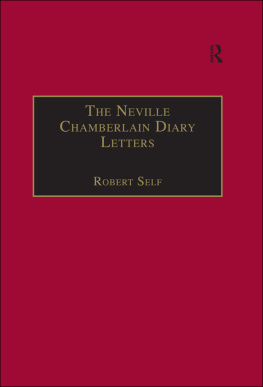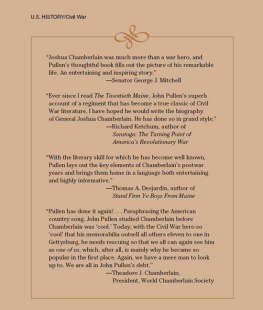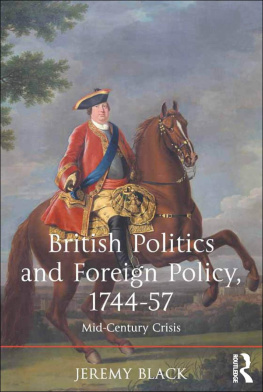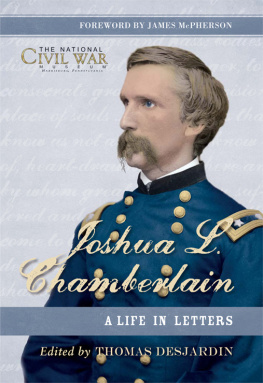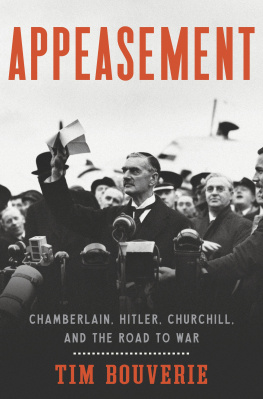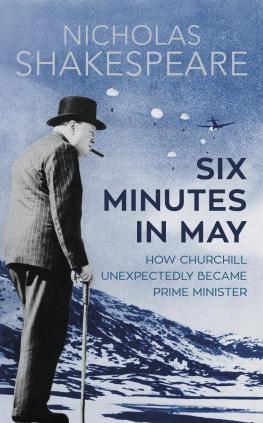The Chamberlain Legacy
Charles Nettlefold
Publisher Information
Published in 2017 by
Imprint Academic
PO Box 200, Exeter EX5 5YX
Digital edition converted and distributed by
Andrews UK Limited
www.andrewsuk.com
Copyright 2017 Charles Nettlefold
The right of Charles Nettlefold to be identified as the author of this work has been asserted in accordance with the Copyright, Designs and Patents Act 1998.
All rights reserved. No part of this publication may be reproduced, stored in a retrieval system, or transmitted, in any form or by any means without the prior written permission of the publisher, nor be otherwise circulated in any form of binding or cover other than that in which it is published and without a similar condition being imposed on the subsequent purchaser. Any person who does so may be liable to criminal prosecution and civil claims for damages.
The views and opinions expressed herein belong to the author and do not necessarily reflect those of Imprint Academic or Andrews UK Limited.
Comments about The Chamberlain Legacy
This book interweaves in thought provoking fashion the life stories of the three Chamberlain statesmen, bringing out the cross-currents and the light and dark features in their life stories.
Peter T Marsh Honorary Professor of History University of Birmingham
With todays Prime Minister citing Radical Joe as one of her political influences, this cross-generational examination of the Chamberlain dynasty by Charles Nettlefold is a must read for 2017.
It was the success of the family firm, Nettlefold & Chamberlain, that gave Radical Joe the financial footing to first enter politics. Charles Nettlefold provides a fascinating insight into the lives of the three Chamberlains, father and sons, who did so much to shape politics in the 19 th and early 20 th century.
Caroline Squire (nee Chamberlain)
Conservative Home
To my wife Henrietta and our own dynasty: Clemmie, Joe, Matt and young Billy Turner .
Accreditations
All photographs come from the Chamberlain Collection of the Cadbury Research Library at the University of Birmingham except for 12 and 13 which come from the Stone Collection, Birmingham Central Library.
Acknowledgements and Thanks
I want to thank the staff at the Cadbury Research Library for their enthusiasm and patience. I owe my editor, Derek Hall, great gratitude for his diligence and his introduction to my publisher. Lastly I owe where I am in the book world to my dear friend, Andrew Duncan, without whose wise advice I would still be staring at unfinished manuscripts.
House Of Commons
The Chamberlain Legacy is an accessible history of an extraordinary family that lived through and shaped a tumultuous period of British and world history. The Chamberlains were sometimes divisive and there were failures - e.g. religious institutions continue to have a significant influence on the education system. Charles Nettlefold, a descendant of Chamberlains business partner, has succeeded in telling the story of three big figures, but also putting it into the wider historic context.
The Chamberlain legacy is everywhere in Birmingham, but the city is not as conscious of it as it ought to be. One of the few statues of Joe is in the House of Commons and not in Birmingham. But his legacy lives on - we have Birmingham University, our water still comes from Wales and we continue to grow orchids in the glass houses (Joes favourite pastime).
If I had known before I stood for election that I - a woman, a socialist and born near Munich - was contesting Neville Chamberlains old seat I might have had second thoughts. Its a tribute to the openness and diversity of the city that they elected me.
Rt Hon Gisela Stuart
Labour MP Birmingham Edgbaston - Bartley Green, Harborne & Quinton
The Chamberlains
Churchill on Joe:
He made the weather.
Churchill on Austen:
He always plays the game and never wins it.
Churchill on Neville:
The narrowest, most ignorant, most ungenerous of men.
The Chamberlains were the most powerful political dynasty in England between 1876 and 1940 when one, or more usually, two members of the family sat in the Commons, holding between them nearly all the great Offices of State, yet they are largely remembered by their failures. Enoch Powell, ironically, wrote in his biography of Joe, All political lives, unless they are cut off in midstream at a happy juncture, end in failure, because that is the nature of politics and of human affairs. Joes daughter, Hilda, acted as the standard bearer of her fathers and brothers reputations for over fifty years but felt bound to admit in 1956, though each man had, in his own life, his day of glory, each man appeared to have failed in what he set out to perform.
Their place in history has been largely defined by Churchills epithets on each: most generous of Joe, more pitying of Austen, and most cruelly of Neville. Joe strode through history as a force of nature and was certainly the Chamberlain most admired, but not by all. He may have made the weather but the storms resulting were too often destructive and there is little one can grasp from his history that makes his reputation shine. Austen was groomed by Joe to be his successor, but he lacked his fathers drive, preferring to serve men stronger than he, whom he respected and under whose shadow he achieved the stature of an admired Elder Statesman. Neville is the best known, and the most reviled. Of late, his reputation has moved into greater balance between praise and calumny, and it is one that now more fairly reflects his legacy.
The Chamberlains background was very different from that of traditional politicians of that period. First, they were Unitarians, members of a church that had been established in England only since 1774. Secondly, they were industrialists, who had helped create a major business in Birmingham in the 1850s. They came late to national politics, focussing first on local politics in Birmingham. Joe was forty when he became an MP and Neville 50; only Austen moved inevitably into Parliament. Even when first elected, Joe chose not to follow the mainstream, joining instead the Radical wing of the Liberal party. Throughout their careers, their mainstream political contemporaries tended to look down on them: Gladstone called Joe a blackguard and Macmillan said of Neville, he was a nice man, but I thought he was very, very middle class.
This book seeks to focus on the personalities of the three men, examining the interplay between what they wanted to achieve as much as on what they actually did achieve. This analysis of Austen and Neville is made much easier because both were prolific letter writers, sending at least one letter a week to their sisters between 1916 and 1940, and sometimes more, giving detailed recording of events, their part in them and their thoughts on them; Neville also wrote a diary. Joe wrote, but much less extensively, and much less openly and he is a much more difficult personality to understand. Indeed, he may have been driven by demons he may not have himself fully understood.
Chapter 1: 18661873
Joseph (Joe) Chamberlain was born on July 8 th 1836 in Camberwell Grove in south London. His family had come from Lacock in Wiltshire and six members had been Masters of the Cordwainers Company. His father, Joseph, had a successful wholesale boot and shoe business in Cheapside which, by 1846, was making a profit of 105,000 a year. Joseph was an immovable man -nothing could turn him if he had made up his mind, pleasant and quiet in manner. Joe was very proud of his family, declaring many years later in the House of Commons, we have a record of nearly two centuries of unstained commercial integrity and honour.
In 1834 Joseph had married Caroline Harben, the daughter of a cheese merchant and they had six boys and three girls. Their childrens teacher wrote: They were a serious family and Mrs Chamberlain did not wish them to learn anything light or frivolous. They were rich city people and kept much in their own set. They moved to Highbury Place in north London and Joe, the eldest, went to University College School, which was full of boys from Nonconformist families. His teacher said, he possessed a good deal of individuality and a strong will, and always wanted to take the lead in everything. His father refused to send him to University because he decided, if he could not afford to send all his sons, then none should go, so Joe joined the family business when he was sixteen. In his leisure time, he read widely and enjoyed amateur theatricals with his cousins, the Nettlefolds and Kenricks, and he taught Sunday school in the slums close to St Pauls Cathedral. In 1854 his father sent him to Birmingham to join a firm Joseph had formed with his brother-in-law, John Sutton Nettlefold.
Next page

